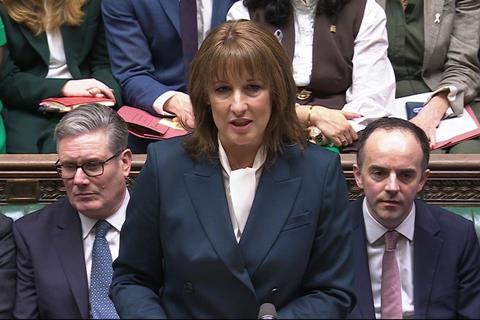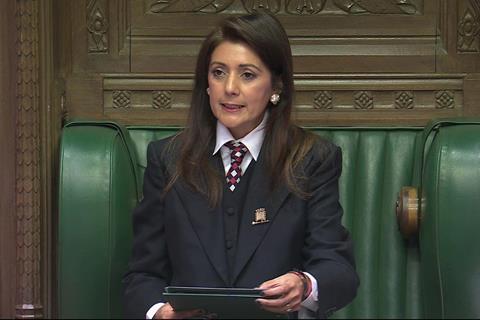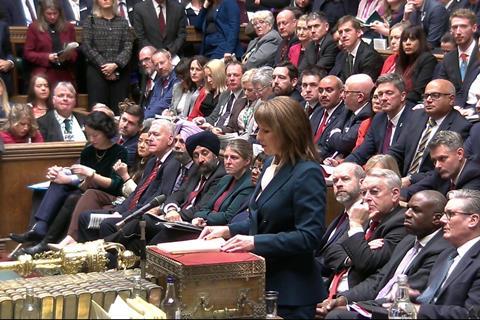The Chancellor of the Exchequer, Rachel Reeves, made her budget statement today. The Gazette covers announcements relevant to lawyers - and reactions from the profession and others - below

15.34:
'Dont panic, plan'!: David Goeppel, head of private client international at Edwin Coe, on what today's statement portends for private clients. 'This Budget continues the quiet re-weighting of the UK tax system towards wealth, investment income and high-value property. For international families and high-net-worth individuals, the combination of higher rates on dividends, savings and property income, extended threshold freezes, a new surcharge on homes over £2 million and further tightening of the rules for international individuals will be felt over time rather than overnight. There are no headline new inheritance tax changes, but capital tax receipts are still expected to rise – and we await further detail on changes to cap charges on trusts established by former non-domiciled individuals, and also on a change to the taxation of post-departure trade profits. The message for private clients is clear: this is a time to revisit holding structures, residence and domicile assumptions, and succession plans in the round – not to panic, but to plan.'
14.18: Michael Carter, partner at Osborne Clarke: ‘Some very good news today is the expansion of EMI schemes, which remains one of the most effective tools for attracting and keeping talent. Up until now, companies that had more than 250 employees and/or gross assets of over £30 million were excluded from benefiting from EMI. With effective from 6 April 2026, these limits will be increased to 500 employees and £120 million respectively, significantly increasing the number of growing companies that can benefit from this vital incentive.'
‘Since the 2014 reforms, around 1,000 companies have moved to employee ownership. These latest changes risk undermining that progress by making the model less attractive and potentially discouraging shareholders from selling their businesses to their employees.”
‘Charging NICs on salary-sacrificed pension contributions is clearly a significant revenue-raising measure – the OBR expects it to generate around £4.7bn by 2029/30, far more than many other headline changes. Whilst the move delivers short-term fiscal benefit, it also raises a broader question about how measures of this scale may influence long-term saving behaviour and retirement planning. Ensuring that short-term revenue priorities do not inadvertently discourage future pension saving will be an important balance for policymakers to strike.’
14:08: The government has backed away from plans to regulate tax advisers. The Red Book states:
'Following consultation, the government will not regulate tax advisers and will work in partnership with the sector to raise standards in the tax advice market.’
This will likely be viewed as a win for the Law Society, which had warned that new tax adviser legislation from HM Revenue & Customs risked placing an undue burden on professionals without helping taxpayers.
14:06: Here’s what the Red Book has to say on ‘promoters’: 'The government will introduce new powers to close in on promoters of marketed tax avoidance. These will be legislated for in the Finance Bill 2025-26. The government will publish a consultation on further measures to tackle promoters in early 2026.’
Meanwhile, the government is increasing with immediate effect the rewards paid to informants who provide HMRC with high-value information. For cases where tax over £1.5 million is recovered, HMRC will pay rewards up to 30% of the additional tax collected that would otherwise have gone unpaid.
14.05: ‘Looks like the rise in dividend tax makes companies even more unappealing to law firms as a core trading vehicle,’ says PKF’s Andrew Allen. ‘Keeping in mind it’s already 7% cheaper in an LLP for an additional rate taxpayer. (Assuming profits are extracted from both).’
14:00: The budget supporting documents have now been published. One item in the small print:
Economic Crime Levy increase – From 1 April 2026, the former ‘Large’ band for the Economic Crime Levy, covering businesses with a revenue between £36 million and £1bn, is being split into two, (£36 million - £500 million and £500 million - £1 billion). The charge for all bands will be set at 0.1% of revenue for businesses at the bottom of each band (Band A – £10,200, Band B – £36,000, Band C – £500,000, Band D – £1,000,000).
13.58: We have the hard numbers on RDEL (day-to-day) spending by government departments over the next four years. Justice spending will rise from £12bn in 2025-26 to £12.6bn, £12.9bn and then £13.2bn in 2028-29.
13.52: We have the Red Book.
‘Tackling rogue directors – The government will invest £25 million over the next five years to recruit additional Insolvency Service staff to disqualify more rogue directors. The government will also amend the Company Directors Disqualification Act 1986 to extend the circumstances in which directors who break the law can be disqualified. This will be legislated for in a future Finance Bill.’
13:40: The chancellor commends her statement to the house. Next, we’ll be examining HM Treasury's Budget red book in detail.
13:40: PKF’s Andrew Allen adds: ‘The EOT tax benefit changes are interesting and likely to draw a halt to a lot of law firms that may have looked at this route.’
13:39: Andrew Allen, head of the national legal sector team at PKF Francis Clark, offers these early takes on the impact of today’s budget on solicitors. ‘The reduction to relief for pension contributions under salary sacrifice will present and inflationary pressure for salaries in law firms. Another short-sighted measure which will result in future state costs as individuals who can , will provide less for their retirements.
‘The increased tax on property income will hit law firm owners who frequently invest in this area personally. It will also damage the property market for rented properties which is already in turmoil following the changes in renters’ rights.’

13:30: ‘The use of Employee Ownership Trusts (EOTs) within the legal sector had been trailed by some with a number having converted,’ says Menzies’ Peter Noyce (pictured). ‘Whilst we need to see the detail, today’s announcement will make this less attractive, although I was never convinced this didn’t leave the staff behind with potentially unserviceable debt in any case.’
13:30: Other announcements: A call for evidence on how the government can support co-ops.
Motoring tax reform. Drivers will be taxed according to how much they drive, a 3p per mile excise duty on electric cars.
No increases in national insurance, income tax or VAT.
13:21: Ross Anderson, partner at Jones Whyte, warns that budget changes could significantly affect how people write and update their wills, and that delaying action could leave families facing unexpected tax bills. Many people assume their existing will is ‘set and forget’, but changes to inheritance tax thresholds, reliefs and exemptions may mean older documents no longer reflect their intentions.
13:20: ‘The decision to cap salary sacrifice contributions to pension schemes will be incredibly unpopular across the pensions industry,’ says Freeth pensions partner James Dean. ‘Introducing this measure from 2029 risks sending the wrong signal at precisely the wrong time. With many people already struggling to save enough for their retirement, this policy could hugely discourage pension savings and undermine long-term financial security. Rather than incentivising individuals to build adequate retirement pots, it risks creating further barriers to saving.’
13:17: Consultant and former Clifford Chance tax chief Dan Neidle says: ‘There's a reduction in capital gains tax relief for disposals to employee ownership trusts. This was a measure intended to encourage employee ownership. It has been abused in some quarters. A slightly odd tax increase.’

13:15: The chancellor turns to tax: Income tax and national insurance thresholds to be frozen at their current level until 2028. ‘I am asking everyone to make their contribution.’
Reforms to tax, including two percentage point increases in property and savings income.
And here comes the much predicted mansion tax: 'long standing source of wealth inequality: from 2028 introducing an annual £2,500 surcharge for properties worth more than £2 million, collected with council tax'.
13:10: All payments under the Infected Blood Scheme to be exempt from inheritance tax regardless of circumstances.
Seeking £4.9bn efficiencies across government. In health and defence, savings will be re-invested.
Introduction of digital ID will break the link between illegal immigration and working.
Further steps to investigate and collect unpaid tax; new powers for HMRC against enablers of avoidance schemes.
13:03: No hint of new LLP taxes, but still too early for law firm owners to heave a sigh of relief. We don’t see the Red Book until Reeves sits down.
13:00: Today’s budget is being closely watched by law firm adviser Peter Noyce of accountants Menzies. He observes at the outset:
‘Deputy speaker, Nusrat Ghani (pictured), has delivered an historic telling off to the government at the amount and "level of speculation which has preceded this Budget". And the amount of noise in the House would suggest that Santa’s naughty step will be well populated courtesy of the deputy speaker.’

12:55pm: The chancellor welcomes this week’s Nuclear Regulatory Review and says she will announce a plan to cut red tape around nuclear developments within three months.
12:50 pm: Chancellor will retain current corporation tax rate, 'the lowest in the G7'.

12:45 pm: The chancellor is now speaking, announcing a call for evidence on how the tax system can work better for entrepreneurs.
12:25 pm: Embarrassment for the government as the Office for Budget Responsibility Economic and Fiscal Outlook report is leaked early.
On Justice spending, it says this:
'RDEL [day-to-day] spending on the Treasury’s definition rises to £537 billion in 2026 -27 and then to £566 billion by 2028-29, the last year of the Spending Review period. The fastest-growing allocations among the large departments are Health and Social Care, Work and Pensions, and Justice growing respectively at 2.4, 2.2 and 1.2 per cent a year in real terms on average, while other departments’ budgets are broadly flat or falling in real terms over the Spending Review.'
12:00 pm: Accidentally published analysis by the Office of Budget Responsibility includes the following tax announcements:
- Reduced capital gains tax relief on disposals to employee ownership trusts, which raises £0.9 billion;
- A high value council tax surcharge on properties worth over £2 million, raising £0.4bn;
- Tax administration, compliance and debt collection measures, which raise £2.3bn
11:30 am: Tax expert and former magic circle partner Dan Neidle lists an announcement on 'promoters of tax avoidance’ as one thing to look out for in the small print.
This article is now closed for comment.































2 Readers' comments